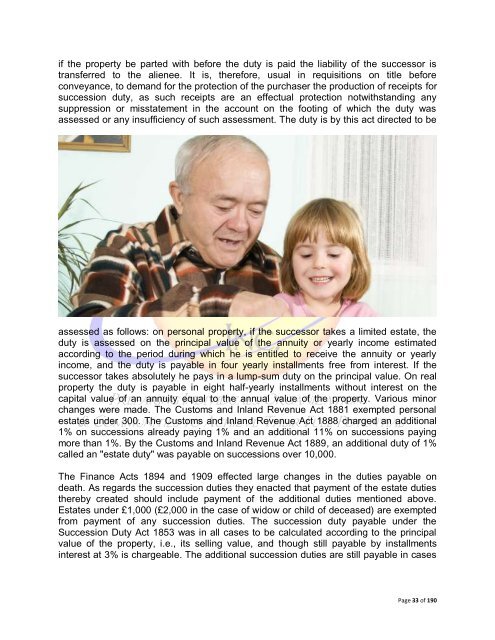Wills, Trusts & Estates
Wills, Trusts & Estates
Wills, Trusts & Estates
Create successful ePaper yourself
Turn your PDF publications into a flip-book with our unique Google optimized e-Paper software.
if the property be parted with before the duty is paid the liability of the successor is<br />
transferred to the alienee. It is, therefore, usual in requisitions on title before<br />
conveyance, to demand for the protection of the purchaser the production of receipts for<br />
succession duty, as such receipts are an effectual protection notwithstanding any<br />
suppression or misstatement in the account on the footing of which the duty was<br />
assessed or any insufficiency of such assessment. The duty is by this act directed to be<br />
assessed as follows: on personal property, if the successor takes a limited estate, the<br />
duty is assessed on the principal value of the annuity or yearly income estimated<br />
according to the period during which he is entitled to receive the annuity or yearly<br />
income, and the duty is payable in four yearly installments free from interest. If the<br />
successor takes absolutely he pays in a lump-sum duty on the principal value. On real<br />
property the duty is payable in eight half-yearly installments without interest on the<br />
capital value of an annuity equal to the annual value of the property. Various minor<br />
changes were made. The Customs and Inland Revenue Act 1881 exempted personal<br />
estates under 300. The Customs and Inland Revenue Act 1888 charged an additional<br />
1% on successions already paying 1% and an additional 11% on successions paying<br />
more than 1%. By the Customs and Inland Revenue Act 1889, an additional duty of 1%<br />
called an "estate duty" was payable on successions over 10,000.<br />
The Finance Acts 1894 and 1909 effected large changes in the duties payable on<br />
death. As regards the succession duties they enacted that payment of the estate duties<br />
thereby created should include payment of the additional duties mentioned above.<br />
<strong>Estates</strong> under £1,000 (£2,000 in the case of widow or child of deceased) are exempted<br />
from payment of any succession duties. The succession duty payable under the<br />
Succession Duty Act 1853 was in all cases to be calculated according to the principal<br />
value of the property, i.e., its selling value, and though still payable by installments<br />
interest at 3% is chargeable. The additional succession duties are still payable in cases<br />
Page 33 of 190

















